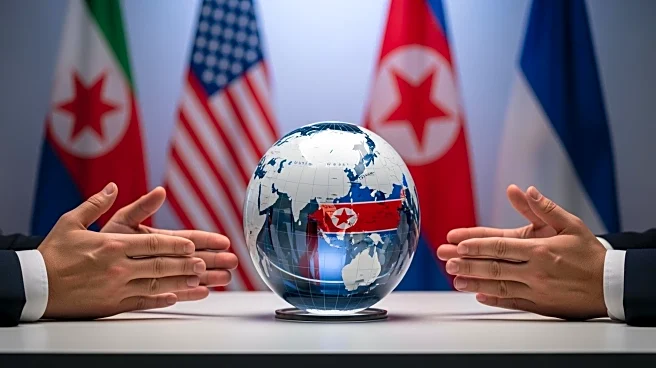What's Happening?
President Trump is set to visit South Korea, sparking speculation about a potential meeting with North Korean leader Kim Jong Un. This would be their first summit since 2019, when they met at the Korean border
village of Panmunjom. While some experts believe a meeting could occur, others are skeptical due to the expansion of North Korea's nuclear program and its increased diplomatic leverage. Kim Jong Un has expressed willingness to resume talks if the U.S. drops its focus on denuclearization. South Korea's Unification Minister suggested a meeting could happen at Panmunjom, but no official plans have been confirmed.
Why It's Important?
The potential meeting between President Trump and Kim Jong Un is significant as it could influence the future of U.S.-North Korea relations and regional stability. North Korea's expanded nuclear capabilities and strengthened alliances with Russia and China have increased its leverage, complicating diplomatic efforts. A meeting could offer Trump a diplomatic achievement, but it remains uncertain if the U.S. can offer concessions that would entice North Korea to negotiate. The outcome could impact U.S. foreign policy and security dynamics in the region, particularly concerning the U.S.'s commitment to South Korea's defense.
What's Next?
If a meeting does not occur during Trump's visit, future diplomatic engagements remain possible. Kim Jong Un may consider resuming talks after a major ruling party conference in January. The U.S. may need to offer significant incentives to bring North Korea back to the negotiating table. The evolving geopolitical landscape, including the Russia-Ukraine conflict, could also influence North Korea's strategic decisions. Observers will watch for any developments that could signal a shift in North Korea's approach to diplomacy with the U.S.
Beyond the Headlines
The potential meeting raises questions about the effectiveness of U.S. sanctions and the broader strategy towards North Korea. Some experts warn against offering extensive sanctions relief for limited denuclearization steps, which could undermine regional security. The situation highlights the challenges of balancing diplomatic engagement with maintaining pressure on North Korea to curb its nuclear ambitions. The outcome of any talks could have long-term implications for U.S. alliances in Asia and the global non-proliferation regime.









